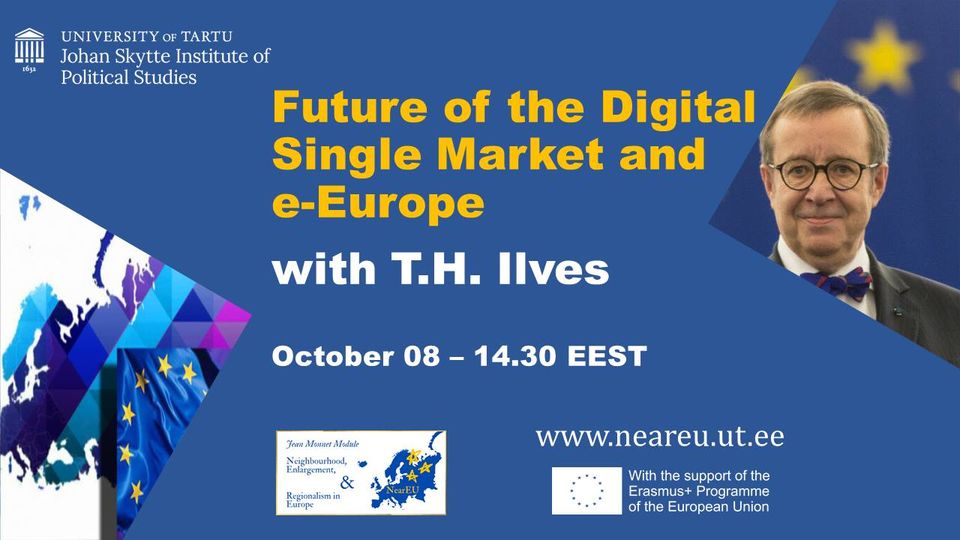2021 NearEU Talk Series with President Toomas Hendrik Ilves
The Jean Monnet Module NearEU pleases to announce the launch of 2021 NearEU Talk Series with President Toomas Hendrik Ilves. The events are aimed to favour public discussion, awareness, and debate on issues related to the present and future of the process of European integration. The Talk series are conducted within the framework of the course “The European Union – Current Affairs” and moderated by Dr. Stefano Braghiroli.
The forthcoming topics include The Future of the Digital Single Market (October 08); The recent developments in the Eastern Neighbourhood (October 22); EU’s East-West divide (November 12); The European Green Deal and Green Transition (November 26), and Democratic Backsliding in the EU (December 10). The events are announced through the Facebook page of “European Union – Russia Studies” and opened to everyone interested. For those not enrolled in the course “The European Union – Current Affairs”, the event will take place exclusively in remote mode.
Toomas Hendrik Ilves was born on December 26, 1953, to an Estonian family living in Stockholm, Sweden. He was educated in the United States, receiving a degree from Columbia University in 1976 and a master’s degree in psychology from the University of Pennsylvania in 1978.
In 1984 he moved to Munich, Germany, to work at the office of Radio Free Europe, first as a researcher and foreign policy analyst and later as the head of the Estonian Desk.
From 1993 to 1996 Ilves served in Washington as the ambassador of the Republic of Estonia to the United States and Canada. During this time, he launched the Tiger Leap Initiative to computerize and connect all Estonian schools online with Education Minister Jaak Aaviksoo. He then served as minister of foreign affairs from 1996 to 1998. After a brief period as chairman of the North Atlantic Institute in 1998, he was again appointed minister of foreign affairs, serving until 2002.
From 2002 to 2004, Ilves was a member of the Estonian Parliament and in 2004 he was elected a member of the European Parliament, where he was vice-president of the Foreign Affairs Committee. As a MEP, he initiated the Baltic Sea Strategy that was later implemented as official regional policy of the European Union.
Ilves was elected president of the Republic of Estonia in 2006. Ilves was re-elected for a second term in office in 2011.
During his presidency, Ilves has been appointed to serve in several high positions in the field of ICT in the European Union. He served as chairman of the EU Task Force on eHealth from 2011 to 2012 and was chairman of the European Cloud Partnership Steering Board at the invitation of the European Commission from 2012 to 2014. In 2013 he chaired the High-Level Panel on Global Internet Cooperation and Governance Mechanisms convened by ICANN. From 2014 to 2015 Ilves was the co-chair of the advisory panel of the World Bank’s World Development Report 2016 “Digital Dividends” and was also the chair of World Economic Forum’s Global Agenda Council on Cyber Security beginning in June 2014.
Starting from 2016, Ilves co-chairs The World Economic Forum working group The Global Futures Council on Blockchain Technology. In 2017 he joined Stanford University as a Bernard and Susan Liautaud Visiting Fellow at the Center for International Security and Cooperation. He is currently Visiting Professor at the Johan Skytte Institute of Political Studies.
President Ilves has published many essays and articles in Estonian and English on numerous topics ranging from Estonian language, history, and literature to global foreign and security policy and cyber security. His books include essay collections in Estonian, Finnish, Latvian, Hungarian, and Russian.




